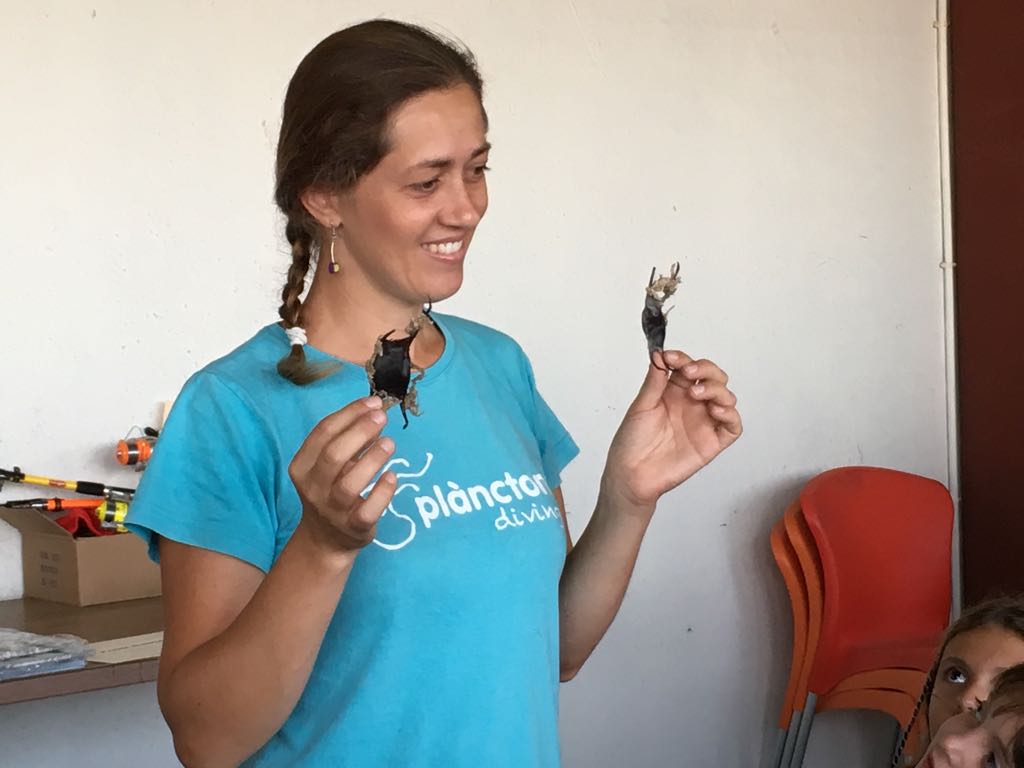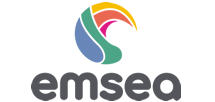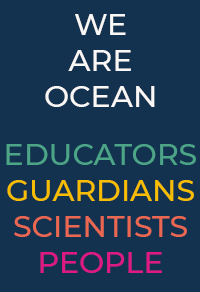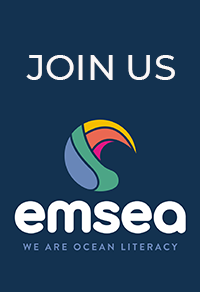From octopus’s heroine to educational enthusiast: Eli Bonfill i Molina about her passion for ocean literacy
With an ocean-loving father, Eli spent her weekends and holidays either at the beach or in the water. Twenty years later, she’s brought that marine love into prison and schools. Behind her desk, at the phone or in the water: her love for talking, connecting and educating is spreading ocean literacy all through Catalonia.

Some of Eli’s most fond memories take her back to the Mediterranean, where her dad went spearfishing, freediving and snorkelling. ‘He used to catch octopuses for lunch and every time he landed one and went back into the water for more, I secretly took the octopus and put it back into the water,’ she smiles. Clearly, she was meant for marine sciences from an early start. In combination with her desire to become a teacher, ocean literacy was just the logic choice.
Lessons from juvenile prison
Her first experience with ocean literacy was in a youth detention centre. Every week for a year, she went to see the youngsters, aged 14 to 21, to talk about a marine-related topic. Here, she had to find ways to explain difficult topics in a way these youngsters could understand. ‘It was both challenging for them to understand and for us to try to explain it in an accessible way. We had to find ways to relate to their own life.’ Also, she found science sometimes clashed with the religious convictions of some of these youngsters. When she wanted to talk about evolution and the origin of life, she was met with resistance and stories about Adam and Eve. However, the experience taught her something invaluable: to listen to the audience and start from there. Something she succeeded in, given the enthusiastic response of the youngsters and their sadness when the project ended.

Escoles Blaves
With that experience in mind, in 2017 Eli got engaged in the first Catalonian Blue Schools project. Eight secondary schools from a rural area were involved in that project. Their teachers were trained and provided with a toolkit. Also, Eli and her colleagues helped the teachers with preparing lessons. ‘It was not about creating lessons fór them, it was about supporting them in how to prepare these lessons themselves and guiding them to the right sources.’ This approach took a lot of effort, but resulted in teaching materials the teachers were truly proud of. These resources were then made available for all other schools in the network.
Today, with ProBlue, Eli continues to enlarge the Blue Schools network in Catalonia. ‘It’s good to have these initiatives, because the ocean is nowhere in the school curriculum and teachers in general don’t know much about it.’ To strengthen that knowledge, Eli is currently working on a database of educational resources. ‘There are many resources out there, but often they’re in a different language or teachers just don’t know what to look for, and where.’ Just as what she did in the prison project, Eli is looking for possible connections already present in the school. ‘For example, a school may have a project involving the water cycle. It’s easy to incorporate the sea there as well. But it can be pretty small-scale too. Biology teachers often use terrestrial examples to explain a concept such as symbiosis. What we do then, is steer them in the direction of using marine examples more often. Especially for inland schools, this can already make a huge difference to better connect the students to the ocean.’

It's not always easy though, to convince the schools of joining. First, there is the time constraint. ‘Teachers in Spain generally are overworked. They’re afraid of spending of lot of time applying for a grant they may not get.’ To tackle that first barrier, it’s important to minimise as much as possible any administrative hassle for the schools. A second challenge is the so-perceived competition with the Green Schools initiative. ‘Green Schools are schools that are already involved in sustainable practices, such as minimising waste, saving paper and energy, growing vegetables and building insect hotels. Often the schools feel reluctant to commit to both initiatives, which is a shame. We should not be competing with each other but working together.’ Another challenge is drawing in the whole school, instead of just one motivated teacher. ‘Because, if those teachers leave the school, the project dies.’ Therefore, it’s important to tackle the school culture, not just one class.
School projects & Plàncton Diving
One way of engaging students in marine sciences, is taking them snorkelling. As co-founder of Plàncton Diving, Eli also offers marine activities and workshops for schools. ‘The activity schools ask for the most is definitively snorkelling. Here, in the Mediterranean Sea, we have some amazing conditions. There is less tidal action, temperatures are often pleasant, the shallow snorkelling area is safe for schools and we have a beautiful underwater landscape.’ The activity starts with a briefing on marine biology, followed by a guided snorkelling tour. Often this activity is combined with an educational workshop regarding fisheries or plastic pollution. The latter involves a beach cleaning as well.
Apart from schools, Plàncton Diving also offers diving classes for adults. These not only attract ocean-lovers. ‘Scuba diving is a sport that is often related with an adrenaline rush. Therefore, we also attract people who know nothing about the sea yet and just come for the experience of being underwater with diving tanks. But then we lure them in with our stories about marine life,’ Eli laughs. ‘Most of them are quite enchanted by what they see underwater. Diving is a good way to engage people who may initially be not that enthusiast at all.’
Another way of reaching a larger audience, is responding to what people like. ‘You could organise a conference about the importance of conserving Posidonia or Neptune seagrass, but who’s going to come? The trick is to meet people where they are going and give them what they like. Therefore, with Plàncton Diving we organised an underwater escape room. We called it the Posidonia Escape Experience and it involved several activities underwater such as looking for something with a metal detector or solving riddles. We made a version for divers, snorkelers and even an on-land-version for families who would rather stay on the beach. The end goal of the game was a puzzle about the human impacts that threaten Posidonia.’
Making an impact, bit by bit, is Eli’s motto and that is exactly what she’s doing. With her science communication projects and hands-on workshops, she slowly changes both people’s minds and behaviour, so building on a better future for both ocean and mankind.
Top tips for Ocean Literacy organisations by Elisabet Bonfill i Molina:
‘Try to link the ocean to people’s everyday life. Ocean literacy is easier if people feel familiar with what you’re talking about.’
‘Be creative. Don’t just stick with presentations and conferences and info sessions. Look at your audience, learn from them and meet them in the places they’re naturally visiting.’
Text by Anke de Sagher for EMSEA
Photos by Eli Bonfill i Molina

Want to join the community? Find out how to become an EMSEA member!
More on Plàncton:
Website: https://www.plancton.cat/
Instagram: https://www.instagram.com/planctondivulga/
LinkedIn: https://www.linkedin.com/in/elisabet-bonfill-molina/
More on Plàncton Diving:
Website: https://www.planctondiving.cat/
Instagram: https://www.instagram.com/planctondiving/
Facebook: https://www.facebook.com/PlanctonDiving
X: https://twitter.com/planctondivulga
More on Institut del Ciències del Mar:
Website: https://icm.csic.es/ca
Instagram: https://www.instagram.com/icm.csic/
Facebook: https://www.facebook.com/InstitutDeCienciesDelMar/
X: https://twitter.com/ICMCSIC
Youtube: https://www.youtube.com/c/institutdecienciesdelmarcsic


